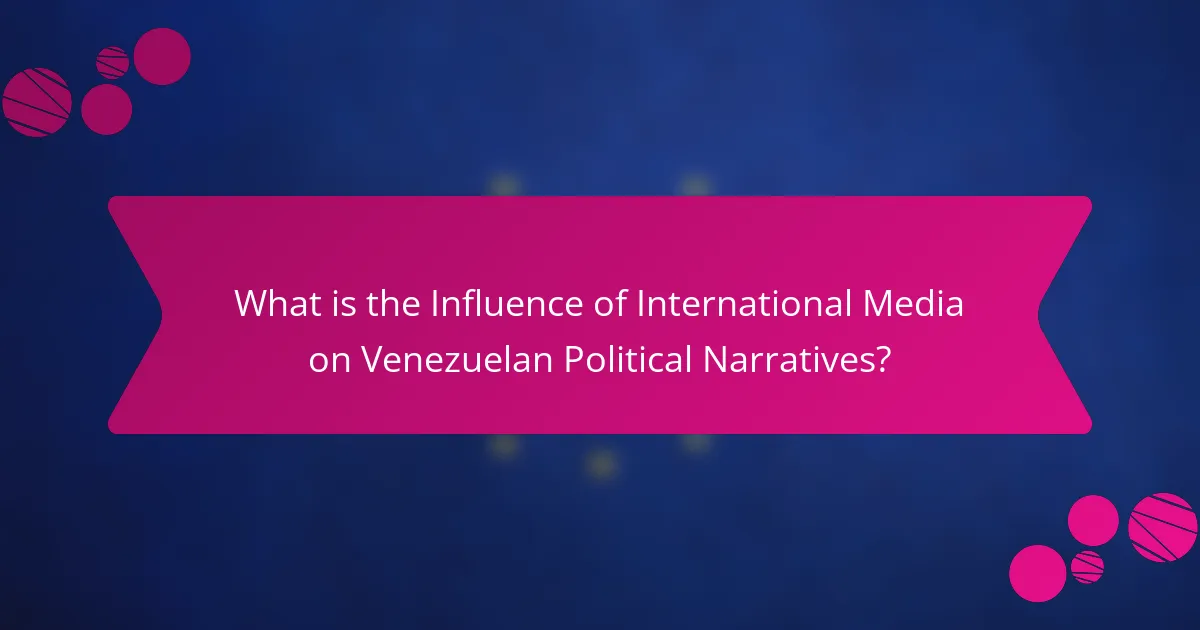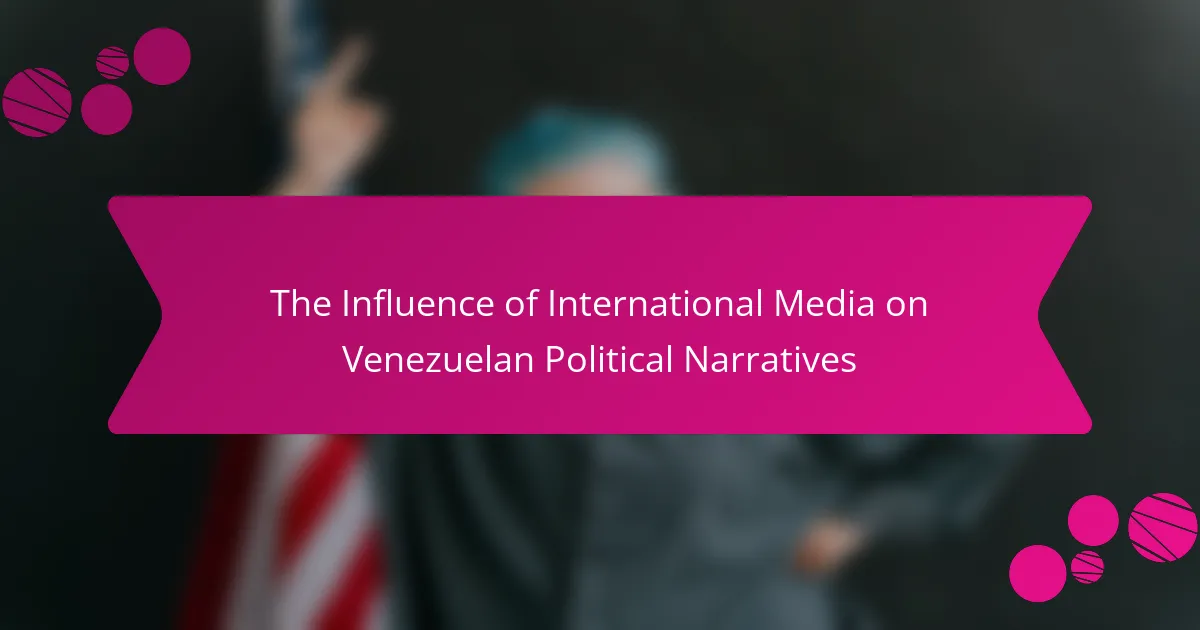
What is the Influence of International Media on Venezuelan Political Narratives?
International media significantly shapes Venezuelan political narratives. It provides coverage that influences public perception and opinion both domestically and internationally. Reports from outlets like BBC and CNN often highlight issues such as human rights abuses and economic crises. This coverage can sway the narratives presented by local media, which may be biased or controlled by the government. Studies show that international media can amplify opposition voices and mobilize public sentiment. For instance, during protests, international reporting can draw global attention, impacting government actions. The framing of events by international media often contrasts with state narratives, creating a complex information landscape. This dynamic affects how Venezuelans understand their political situation and the actions of their government.
How does international media shape political perceptions in Venezuela?
International media significantly shapes political perceptions in Venezuela through coverage and framing of events. This coverage often highlights the government’s actions and opposition protests. For instance, international outlets frequently report on human rights abuses in Venezuela. This reporting can influence both domestic and international views of the government. Furthermore, the portrayal of economic crises in Venezuela affects public sentiment. Many Venezuelans access international media for information not available locally. This access can create a narrative contrasting with state-controlled media. Studies show that exposure to international news correlates with increased political awareness among Venezuelans. Thus, international media plays a crucial role in shaping political narratives in Venezuela.
What are the primary channels of international media influencing Venezuela?
The primary channels of international media influencing Venezuela include satellite television, social media platforms, and online news websites. Satellite television channels like CNN en Español and BBC Mundo provide news coverage and analysis. Social media platforms such as Twitter and Facebook facilitate real-time communication and information sharing. Online news websites like El País and The Guardian offer in-depth reporting and commentary on Venezuelan affairs. These channels shape public perception and political narratives both domestically and internationally. Their influence is evident in the way they report on political events, humanitarian crises, and economic challenges in Venezuela.
How do different media outlets portray Venezuelan politics?
Different media outlets portray Venezuelan politics through varying lenses, often influenced by their geographical and political biases. International outlets like CNN and BBC tend to focus on the humanitarian crisis and government repression. They highlight the economic struggles and migration issues faced by Venezuelans. In contrast, state-controlled Venezuelan media emphasize government achievements and portray opposition as foreign agents. This creates a polarized narrative. Research by the Center for Strategic and International Studies indicates that coverage often reflects the political stance of the outlet’s home country. Thus, the portrayal of Venezuelan politics is deeply intertwined with international relations and media ownership.
Why is the role of international media significant in Venezuela?
The role of international media is significant in Venezuela due to its ability to shape public perception and political narratives. International media outlets provide coverage that often contrasts with state-controlled media. This coverage can highlight human rights abuses and economic crises. For instance, reports from organizations like Human Rights Watch document violations in Venezuela. Furthermore, international media can amplify the voices of opposition leaders. This exposure can influence both domestic and foreign policy decisions. In 2019, international media coverage of protests contributed to global awareness and support for Venezuelan opposition. Thus, international media serves as a crucial platform for information dissemination and advocacy.
What historical context contributes to the current media landscape in Venezuela?
Venezuela’s current media landscape is heavily influenced by its historical context of political upheaval and government control. Since the late 1990s, under Hugo Chávez, the government began to exert significant control over media outlets. Chávez’s administration implemented laws that restricted press freedom and targeted dissenting journalists. This trend continued under Nicolás Maduro, who intensified censorship and used state resources to dominate the media narrative. By 2018, Reporters Without Borders ranked Venezuela 148th out of 180 countries in press freedom. Economic crises have also led to the closure of numerous independent media outlets, further consolidating state control. The historical context of authoritarian governance has shaped a media environment where independent journalism is severely constrained.
How do international media narratives impact public opinion in Venezuela?
International media narratives significantly shape public opinion in Venezuela. These narratives often frame the political situation, influencing perceptions of the government and opposition. For instance, coverage of humanitarian crises can evoke sympathy and support for international intervention. Studies show that consistent negative portrayals of the Venezuelan government lead to increased public discontent. Reports from organizations like Human Rights Watch highlight abuses, swaying public sentiment against the regime. Conversely, positive narratives about government initiatives can bolster support among loyalists. Overall, international media plays a crucial role in shaping the political landscape and public opinion in Venezuela.
What are the challenges faced by international media in covering Venezuela?
International media face significant challenges in covering Venezuela. The Venezuelan government imposes strict controls on information dissemination. Journalists often encounter censorship and intimidation. Access to reliable sources is frequently restricted. The political climate creates a hostile environment for reporting. Many media outlets struggle with limited resources. Safety concerns prevent reporters from covering certain areas. The complex socio-political situation complicates accurate reporting. These factors hinder comprehensive coverage of events in Venezuela.
What restrictions do international journalists encounter in Venezuela?
International journalists in Venezuela face significant restrictions on their reporting activities. The government imposes strict controls over media access and information dissemination. Journalists often encounter harassment, intimidation, and even detention by security forces. The government frequently denies entry to foreign reporters and restricts their movement within the country. Additionally, there are laws that limit press freedom and impose heavy fines for publishing content deemed unfavorable to the government. Reports from organizations like Human Rights Watch highlight these challenges. These restrictions severely impact the ability of international journalists to cover events and provide accurate information about the situation in Venezuela.
How does government censorship affect international media reporting?
Government censorship significantly restricts international media reporting. It limits access to information and hinders journalists’ ability to cover events accurately. Censorship can lead to misinformation and biased narratives. For instance, in Venezuela, the government has imposed strict controls on media outlets. This has resulted in international reporters facing obstacles in obtaining reliable data. As a result, the portrayal of political situations may be skewed or incomplete. Censored media can also lead to a lack of diverse perspectives in international reporting. Overall, government censorship undermines the integrity and credibility of international media coverage.
How do Venezuelan political actors respond to international media narratives?
Venezuelan political actors often reject international media narratives. They claim these narratives misrepresent the country’s situation. Government officials frequently label international media as biased or imperialist. They argue that coverage is influenced by foreign interests, particularly from the United States. Political leaders utilize state-controlled media to counteract these narratives. They promote alternative perspectives on national issues. This includes emphasizing social programs and economic achievements. Additionally, they engage in social media campaigns to reach a broader audience. These responses reflect a strategy to maintain political legitimacy amid external criticism.
What strategies do political leaders use to counteract international media influence?
Political leaders use various strategies to counteract international media influence. These strategies include promoting state-controlled media to disseminate their narratives. Leaders often engage in direct communication through social media platforms to reach their audiences. They may also utilize diplomatic channels to challenge negative portrayals in international media. Additionally, leaders frequently employ public relations campaigns to reshape their image abroad. Historical examples include Venezuela’s use of Telesur to present its perspective. Such efforts aim to counteract perceived biases and control the narrative.
How do opposition groups leverage international media to their advantage?
Opposition groups leverage international media to amplify their messages and gain global support. They strategically use platforms such as television, social media, and news outlets to broadcast their narratives. This approach allows them to reach a wider audience beyond local borders. By showcasing human rights abuses and government corruption, they attract international attention. For instance, the Venezuelan opposition has utilized social media campaigns to highlight the humanitarian crisis in the country. These efforts often lead to increased pressure on the Venezuelan government from foreign entities. Additionally, international media coverage can influence diplomatic relations and foreign aid decisions. Therefore, opposition groups effectively utilize international media to shape perceptions and mobilize support against authoritarian regimes.
What are the implications of international media narratives on Venezuelan society?
International media narratives significantly shape Venezuelan society. These narratives influence public perception of the political situation. They often portray Venezuela in a negative light, emphasizing issues like economic collapse and human rights violations. This portrayal can lead to increased international sanctions and diplomatic isolation.
Additionally, international media shapes the opinions of Venezuelans living abroad. Many rely on these narratives for understanding their home country. This can create a disconnect between the diaspora and those living in Venezuela.
Moreover, the narratives impact local media coverage. Venezuelan media may align with international perspectives to gain credibility. This can limit the diversity of viewpoints presented to the public.
In summary, international media narratives affect political discourse, public perception, and the relationship between Venezuelans at home and abroad.
How do these narratives affect the perception of democracy in Venezuela?
Narratives shaped by international media significantly influence the perception of democracy in Venezuela. These narratives often portray the Venezuelan government as authoritarian. This portrayal can lead to a negative public perception of democratic processes within the country. For instance, reports highlighting electoral irregularities contribute to skepticism about the legitimacy of elections. Additionally, media coverage of political repression reinforces the belief that democracy is under threat. This situation can diminish public trust in democratic institutions. Consequently, international narratives can shape both domestic and global views on Venezuela’s political landscape. Reports from organizations like Human Rights Watch and Amnesty International underscore these concerns.
What role does social media play in amplifying international media narratives?
Social media plays a crucial role in amplifying international media narratives. It serves as a platform for rapid dissemination of information. Users can share news stories, opinions, and analysis instantly. This accelerates the spread of narratives across borders. For example, during political events, hashtags can trend globally, increasing visibility. Research shows that social media can influence public perception significantly. A study by the Pew Research Center found that 62% of adults get news from social media. This indicates that social media shapes how international narratives are consumed. Furthermore, it allows marginalized voices to contribute to mainstream discussions. Thus, social media enhances the reach and impact of international media narratives.
What best practices can be adopted for responsible reporting on Venezuelan politics?
Responsible reporting on Venezuelan politics requires accuracy, context, and sensitivity. Journalists should verify facts through multiple reliable sources. This ensures information is credible and trustworthy. Providing historical context is essential. It helps audiences understand the complexities of Venezuelan politics. Journalists must avoid sensationalism. Sensational reporting can distort public perception and escalate tensions. Engaging with local voices adds depth to narratives. This approach highlights diverse perspectives within Venezuela. Ethical considerations should guide reporting practices. Respect for individuals and communities is paramount. Transparency about sources and methods enhances credibility. Following these best practices fosters informed public discourse on Venezuelan politics.
The main entity of this article is the influence of international media on Venezuelan political narratives. The article examines how international media coverage shapes public perception and political discourse in Venezuela, highlighting the contrasting portrayals by state-controlled media and international outlets. Key topics include the channels through which international media operates, the challenges faced by journalists, and the implications of media narratives on public opinion and democracy in Venezuela. Additionally, it discusses the strategies employed by both government and opposition groups in response to international media influence.
